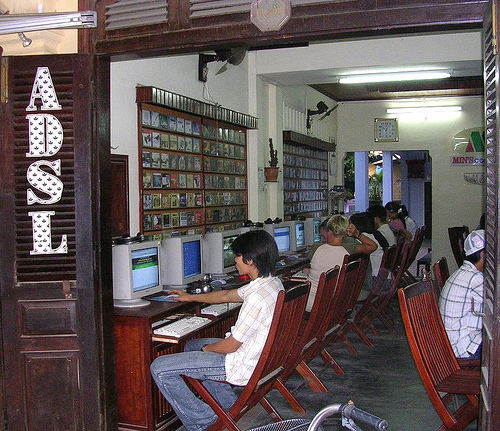Vietnam’s new Internet decree made public on July 31 instantly generated controversy after it purportedly contains several provisions that would ban the sharing of news stories in various social networks. But the government clarified that the decree is aimed only at protecting copyright. The regulation will take effect on September 1.
Decree 72/2013/ND-CP or “Management, Provision, Use of Internet Services and Information Content Online” was signed by Prime Minister Nguyen Tan Dung on July 15. It consists of 6 chapters and 46 articles covering these topics:
…internet services and resources, the management, provision, and usage of online information, the establishment of websites and social networks, information about telecommunication networks, online games, and online information safety and security.
But the controversial 20.4 clause of the decree bothered many people for banning ‘compiled information’:
…personal information webpage is a webpage created by individual on their own or via a social network. This page should be used to provide and exchange information of that individual only; it does not represent other individual or organization, and is not allowed to provide compiled information
What exactly is a ‘compiled information’? Tuổi Trẻ newspaper quoted Vietnam’s Broadcast and Electronic Information Department which interpreted it as a reminder for individuals not to “quote or share information from press agencies or websites of government agencies.”
Deputy Minister of Information and Communications Le Nam Thang said the new decree is to prevent misuse of the Internet to spread false information. It is also intended to help users “find correct and clean information on the internet.”
Personal webpage owners are only allowed to provide their own information, and are prohibited from taking news from media agencies and using that information as if it were their own
As expected, the law also enumerated some prohibited acts (Article 5):
…information that is against Vietnam, undermining national security, social order, and national unity […] or information distorting, slandering, and defaming the prestige of organisations, honour and dignity of individuals.
The Vietnam Committee on Human Rights, which described the decree as “is fatally flawed and inconsistent with international human rights law and standards,” mentioned another potential dangerous provision in the decree:
Article 25 requires the filtering of any information on the Internet based on the interpretation that such information is amongst the “prohibited acts” outlined in Article 5. Foreign Internet Service Providers will have to provide information about their users when requested by investigative bodies.
Vietnam authorities immediately held a press forum to correct the ‘misunderstanding’ caused by the publication of the decree. They claimed that the decree would facilitate the development of Internet standards in the country:
The decree generates conditions for the development of internet information forms by licensing websites, social networks, and service supply registration
They also insisted that the decree has no provision prohibiting individuals to share information on social networks:
Decree 72 has no word or sentence prohibiting individuals from using social networks to share and collect information, so it has never been a threat to online reporters and bloggers
According to the decree, individuals have the right to collect and share information on social networks. It stipulates that individuals are allowed to cite information and attach a link to the source information so other people can refer to the original, full information. The decree aims to protect intellectual property rights and the copyright of press agencies. In fact, many press agencies are concerned about copyright and author rights.
Indeed, rising cases of copyright infringements has alarmed many companies and businesses. But Steven Millward of Tech in Asia thinks that Vietnam’s new Internet decree is not fixing the problem:
Vietnam seems to be striking at social media and individual sharing rather than fixing the cause of the problem: content piracy by lazy news sites. Surely media industry regulation would be a better move than this kind of ban.
Reporters Without Borders criticized the decree as “the harshest offensive against freedom of information”:
The announced decree is nothing less than the harshest offensive against freedom of information since Prime Minister Nguyen Tan Dung signed a decree imposing tough sanctions on the media in 2011
If it takes effect, Vietnamese will be permanently deprived of the independent and outspoken information that normally circulates in blogs and forums.
The decree is both nonsensical and extremely dangerous. Its implementation will require massive and constant government surveillance of the entire Internet, an almost impossible challenge. But, at the same time, it will reinforce the legislative arsenal available to the authorities.
Phil Robertson of Human Rights Watch is worried that the decree will be used for ‘selective persecution’:
This is a law that has been established for selective persecution. This is a law that will be used against certain people who have become a thorn in the side of the authorities in Hanoi








14 comments